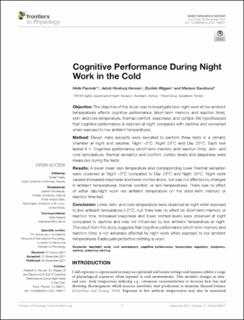| dc.contributor.author | Færevik, Hilde | |
| dc.contributor.author | Hansen, Jakob Hønborg | |
| dc.contributor.author | Wiggen, Øystein | |
| dc.contributor.author | Sandsund, Mariann | |
| dc.date.accessioned | 2022-08-26T11:39:54Z | |
| dc.date.available | 2022-08-26T11:39:54Z | |
| dc.date.created | 2021-12-14T12:13:36Z | |
| dc.date.issued | 2021 | |
| dc.identifier.citation | Frontiers in Physiology. 2021, 12, 768517. | en_US |
| dc.identifier.issn | 1664-042X | |
| dc.identifier.uri | https://hdl.handle.net/11250/3013778 | |
| dc.description.abstract | Objective: The objective of this study was to investigate how night work at low ambient temperatures affects cognitive performance (short-term memory and reaction time), skin- and core temperature, thermal comfort, sleepiness, and cortisol. We hypothesized that cognitive performance is reduced at night compared with daytime and worsened when exposed to low ambient temperatures.
Method: Eleven male subjects were recruited to perform three tests in a climatic chamber at night and daytime: Night –2°C, Night 23°C and Day 23°C. Each test lasted 6 h. Cognitive performance (short-term memory and reaction time), skin- and core temperature, thermal sensation and comfort, cortisol levels and sleepiness were measured during the tests.
Results: A lower mean skin temperature and corresponding lower thermal sensation were observed at Night –2°C compared to Day 23°C and Night 23°C. Night work caused increased sleepiness and lower cortisol levels, but was not affected by changes in ambient temperatures, thermal comfort, or skin temperatures. There was no effect of either day/night work nor ambient temperature on the short-term memory or reaction time test.
Conclusion: Lower skin- and core temperature were observed at night when exposed to low ambient temperature (–2°C), but there was no effect on short-term memory or reaction time. Increased sleepiness and lower cortisol levels were observed at night compared to daytime and was not influenced by low ambient temperature at night. The result from this study suggests that cognitive performance (short-term memory and reaction time) is not adversely affected by night work when exposed to low ambient temperatures if adequate protective clothing is worn. | en_US |
| dc.language.iso | eng | en_US |
| dc.publisher | Frontiers | en_US |
| dc.rights | Navngivelse 4.0 Internasjonal | * |
| dc.rights.uri | http://creativecommons.org/licenses/by/4.0/deed.no | * |
| dc.subject | Day/night work | en_US |
| dc.subject | Cold environment | en_US |
| dc.subject | Cognitive performance | en_US |
| dc.subject | Temperature regulation | en_US |
| dc.subject | Sleepiness | en_US |
| dc.subject | Cortisol | en_US |
| dc.subject | Protective clothing | en_US |
| dc.title | Cognitive Performance During Night Work in the Cold | en_US |
| dc.type | Peer reviewed | en_US |
| dc.type | Journal article | en_US |
| dc.description.version | publishedVersion | en_US |
| dc.rights.holder | © 2021 Færevik, Hansen, Wiggen and Sandsund | en_US |
| dc.source.volume | 12 | en_US |
| dc.source.journal | Frontiers in Physiology | en_US |
| dc.identifier.doi | 10.3389/fphys.2021.768517 | |
| dc.identifier.cristin | 1968324 | |
| dc.relation.project | Norges forskningsråd: 237779 | en_US |
| dc.source.articlenumber | 768517 | en_US |
| cristin.ispublished | true | |
| cristin.fulltext | original | |
| cristin.qualitycode | 1 | |

